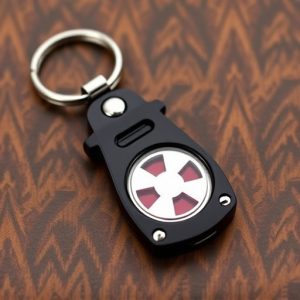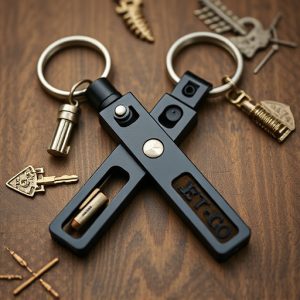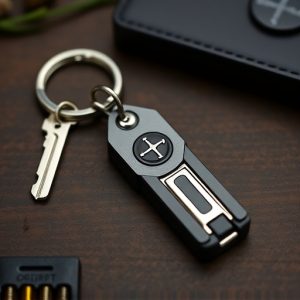Pocket Sized Keychain Defense Weapons: Navigating Global Legal Requirements
Pocket-sized keychain defense weapons (PSKW) offer a compact self-defense solution for personal safe…….
Pocket-sized keychain defense weapons (PSKW) offer a compact self-defense solution for personal safety while walking alone or traveling, appealing to users seeking discretion and convenience. However, their legal status varies widely globally, with regulations differing by region, country, state, and even province. Understanding local laws is crucial to ensure compliance and avoid legal issues, as what's permitted in one place might be regulated or banned elsewhere. Reputable manufacturers prioritize safety through rigorous testing, ensuring effective deterrents while adhering to impact resistance, edge sharpness, durability, chemical resistance, and safety compliance certifications. Navigating global legal frameworks presents opportunities and challenges for PSKW manufacturers, requiring compliance with local design, sale, possession, and penalty regulations for successful market entry.
In today’s world, personal safety is paramount. Pocket-sized keychain defense weapons offer a compact solution for self-defense, but legal requirements can vary significantly. This article provides an in-depth check on keychain safety device laws, covering everything from understanding these devices to international perspectives. We explore the legal landscape, design and compliance of pocket-sized keychain defense weapons, safety features, and testing protocols. By delving into these aspects, you’ll gain a comprehensive overview of the regulatory environment surrounding this popular self-defense tool.
- Understanding Keychain Defense Weapons: An Overview
- Legal Landscape: Regulations and Permits
- Pocket-Sized Devices: Design and Compliance
- Safety Features and Testing Protocols
- International Perspectives: A Global Look at Legal Requirements
Understanding Keychain Defense Weapons: An Overview
Pocket-sized keychain defense weapons are compact self-defense tools designed to fit easily in a purse, pocket, or keyring. These devices often feature a sharp blade, spike, or point that can be used to deter or escape from potential threats. Their small size and discreet nature make them appealing for personal safety, especially for individuals who may be at higher risk while walking alone or traveling.
These tools serve as a last resort when facing dangerous situations, offering a means of protection without drawing excessive attention. However, it’s crucial to understand that laws surrounding pocket-sized keychain defense weapons vary significantly by jurisdiction. Some regions have strict regulations on the type, size, and carry of such devices, while others may have less stringent rules or no restrictions at all. Knowing and adhering to local legal requirements is essential to ensure compliance and avoid potential legal consequences.
Legal Landscape: Regulations and Permits
In many jurisdictions, the legal landscape surrounding pocket-sized keychain defense weapons is complex and ever-evolving. It’s crucial to understand that regulations vary greatly from country to country, and even within different states or provinces. What may be permitted in one place could be strictly regulated or outright banned in another. When considering a keychain defense weapon, such as those designed for personal safety, it’s essential to check local, state, and federal laws to ensure compliance with all relevant regulations.
Permits and licenses play a significant role in the legal requirements for carrying pocket-sized keychain defense weapons. Some locations mandate permits or registration for certain types of self-defense devices, while others may have specific restrictions on where and how they can be used or carried. Staying informed about these legal aspects is vital to avoid any potential consequences, including fines or criminal charges. Always consult official government resources or seek legal advice for the most accurate and up-to-date information regarding keychain defense weapons in your area.
Pocket-Sized Devices: Design and Compliance
In the realm of personal safety, pocket-sized keychain defense weapons have emerged as a convenient and discreet option for individuals seeking self-defense solutions on the go. These compact devices are designed to fit comfortably in one’s pocket or purse, offering a sense of security in various situations. When it comes to legality, understanding compliance is paramount. Each region has its own set of regulations governing the use and possession of such devices, ensuring public safety and preventing misuse.
Design-wise, these keychain weapons prioritize functionality without compromising portability. They often incorporate features like sharp blades, non-lethal force mechanisms, or even pepper spray options. Compliance with local laws is ensured through adherence to specific design guidelines, material choices, and safety standards. As a result, users can benefit from a reliable self-defense tool while navigating the legal framework surrounding pocket-sized keychain defense weapons.
Safety Features and Testing Protocols
When evaluating pocket-sized keychain defense weapons, safety features and rigorous testing protocols are paramount. These compact self-defense tools often incorporate various mechanisms like sharp edges, impact barriers, or pepper spray dispensers designed to ensure user safety during emergency situations. Reputable manufacturers adhere to stringent industry standards and conduct extensive tests to validate the effectiveness and reliability of their products.
Safety testing typically involves simulative scenarios to assess the weapon’s performance under stress. This includes impact resistance checks, edge sharpness evaluation, and durability tests over extended periods. Additionally, some models may undergo chemical resistance assessments for pepper spray functionality and safety compliance certifications from recognized authorities. Such protocols ensure that the keychain defense weapons not only deter potential threats but also operate safely in various conditions.
International Perspectives: A Global Look at Legal Requirements
In the global landscape, the legal status and regulations surrounding pocket-sized keychain defense weapons (PSKW) vary widely from country to country. Understanding these international perspectives is crucial when evaluating the legal requirements for introducing such devices into different markets. Some nations have embraced PSMKs as a viable personal safety measure, integrating them into existing laws governing self-defense tools. These countries often categorize PSKDs as non-lethal weapons, subject to specific restrictions on their design, sale, and possession.
On the other hand, many jurisdictions maintain stringent controls or outright prohibit pocket-sized keychain defense devices due to concerns related to public safety and potential misuse. Some nations require mandatory licensing or registration for such weapons, while others classify them as controlled substances, subjecting users to strict penalties. As a result, manufacturers and importers must navigate a complex web of regulations, ensuring compliance with local laws to bring their PSKDs to market successfully.
In conclusion, navigating the legal requirements for keychain safety devices involves a comprehensive understanding of regional regulations, especially when considering pocket-sized keychain defense weapons. As global perspectives highlight diverse legal landscapes, manufacturers must adhere to stringent safety features and testing protocols to ensure compliance. By staying informed about these key aspects, businesses can offer reliable and legally sound products, empowering users with peace of mind while prioritizing safety in various environments.


